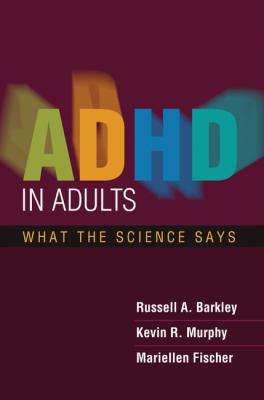Summary
Providing a new perspective on ADHD in adults, this compelling book analyzes findings from two major studies directed by leading authority Russell A. Barkley. Groundbreaking information is presented on the significant impairments produced by the disorder across major functional domains and life activities, including educational outcomes, work, relationships, health behaviors, and mental health. Thoughtfully considering the treatment implications of these findings, the book also demonstrates that existing diagnostic criteria do not accurately reflect the way ADHD is experienced by adults, and points the way toward developing better criteria that center on executive function deficits. Accessible tables, figures, and sidebars encapsulate the study results and offer detailed descriptions of the methods used.
Reviews
"The single best source of scientific information on adult ADHD available to date. The results of two major research investigations are thoroughly reviewed to explicate important similarities and differences between children with ADHD followed into adulthood and individuals first referred for ADHD symptoms as adults. This is the first text to make this important and clinically relevant distinction. It is sure to be an indispensable resource for both clinicians and researchers. In addition, graduate students in clinical psychology, counseling, social work, and school psychology will find this text helpful both for the data it provides about adult ADHD and for its insights into how to establish a coherent research agenda."
-George J. DuPaul, PhD, Department of Education and Human Services, Lehigh University
"A veritable tour de force. This work will be equally useful to researchers seeking innovative hypotheses about ADHD, to clinicians seeking to understand the course of ADHD into adulthood, and to students at all levels of training. Readers have access to a unified and systematic view of the results from two notable, methodologically rigorous research studies. The book addresses a wide range of clinically urgent issues, such as psychiatric comorbidity, drug use, life impairments, educational attainment, and neuropsychological impairment. The discussions of diagnostic criteria not only provide clinically useful information for adult assessment, but also should strongly influence the evolution of the DSM-V."
-Stephen V. Faraone, PhD, Department of Psychiatry and Behavioral Sciences; Director, Medical Genetics Research; and Director, Child and Adolescent Psychiatry Research, SUNY Upstate Medical University
"This energetic and informative book tackles head-on the knotty issue of what ADHD in adults really means. It includes helpful answers to such vital problems as what modifications to diagnostic criteria are appropriate, and what are the inferential biases to which clinicians are prone seeing self-referred cases in their offices. This is the most definitive work to date on the difficult task of generalizing from children with ADHD to adults with ADHD. The authors break new ground in addressing these issues with comprehensive data from their own well-regarded samples. This timely book thus provides a fresh and needed perspective to help resolve longstanding difficulties in understanding ADHD in adults."
-Joel T. Nigg, PhD, Department of Psychology, Michigan State University
Contents
- Introduction
- History and Prevalence of ADHD in Adults
- Diagnostic Criteria for ADHD in Adults
- Defining ADHD in Adults: Making the Diagnosis in the UMASS and Milwaukee Studies
- DSM Symptom Utility and the Issue of Age of Onset
- Impairment in Major Life Activities
- Identifying New Symptoms of ADHD in Adulthood
- Comorbid Psychiatric Disorders and Psychological Maladjustment
- Educational and Occupational Functioning
- Drug Use and Antisocial Behavior
- Health, Lifestyle, Money Management, and Driving
- . Sex, Dating and Marriage, Parenting, and Psychological Adjustment of Offspring
- Neuropsychological Functioning
- Summary, Conclusions, and Treatment Implications


